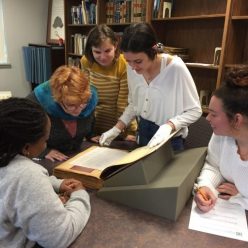by Madeline Dietrich, Music Special Collections and Research Specialist
I am pleased to announce the publication of a new digital exhibition, Russell Stanger: Portrait of an American Conductor, and I’d like to take a moment to offer some background on the project. It began in 2018 with the charge to identify correspondence and photographs from the Russell Stanger Papers documenting Maestro Stanger’s friendship with Leonard Bernstein in celebration of the latter’s 100th birthday. It turns out the collection contains only a few items directly relating to Stanger and Bernstein’s relationship, however, as I pored through the collection it became clear that there was more than enough material to create an exhibition focused solely on Russell Stanger.
The Russell Stanger Papersis a large collection, consisting of over 75 linear feet of materials including manuscripts, conducting scores, original works, photographs, correspondence, sound recordings, and ephemera from Stanger’s long career as an internationally known conductor and composer. Due to the constraints of the physical space designated for the exhibition I selected only visual materials (photographs, newspaper clippings, program covers) and omitted any multi-media objects (sound recordings, video footage). Further, I wished to target a general audience and thus I avoided inclusion of esoteric materials (for example, items consisting of notated music).
The physical exhibition was installed in the Diehn Building at ODU during the fall of 2018 and remained in place for 18 months. It was arranged chronologically and covered Stanger’s young adulthood through the time he was hired by the Norfolk Symphony Group in 1966 and was intended to showcase Stanger’s credentials as a conductor and why he was hired to lead the Norfolk Symphony as music director. At the outset of the Covid-19 pandemic it was decided to digitize the exhibition and expand it to include Stanger’s entire career through his retirement in the late 2000s, and this online exhibition is the result.
In keeping with the original intent, the exhibition focuses solely on Stanger’s professional life, omitting materials relating to Stanger’s personal life and focusing on visual materials. Additionally, there is little attention in the exhibition relating to Stanger’s significant contributions as a composer. Despite these omissions it is my sincere hope that the items displayed here are sufficient to give at least a basic account of Russell Stanger’s career as conductor, orchestra-builder, and Maestro.

